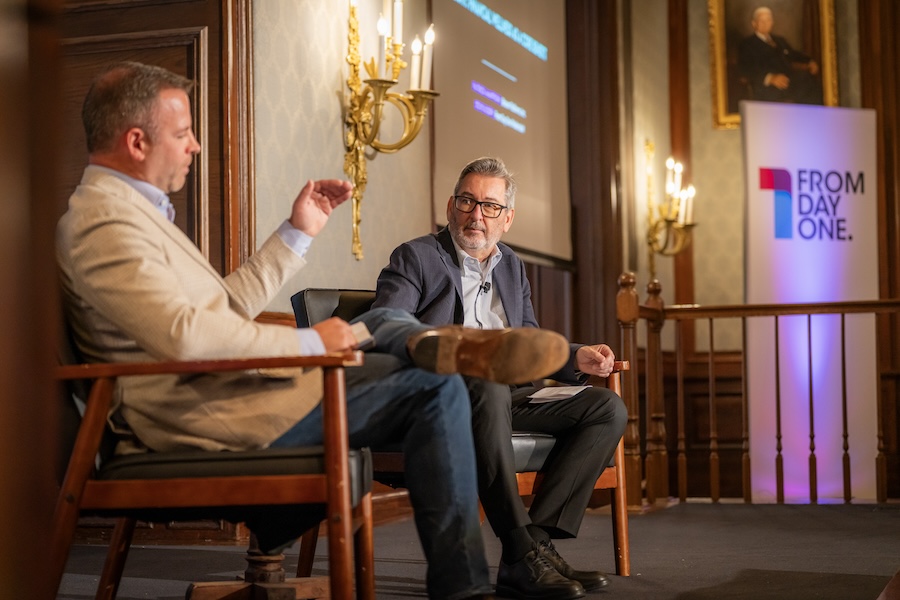Financial Wellness and the Evolution of Care in the Workplace


“When there are problems at home, there are problems at work,” said Patrick Manfroni, director of business development and partnerships at Stream, during a thought leadership spotlight at From Day One’s Philadelphia conference.
“Taking that problem into the office or into the workplace is obviously going to have a direct impact on your performance,” he said during the session titled, “Financial Wellness as a Core Benefit.”
For decades, employers treated workers’ financial lives as personal territory—a private matter, separate from the office. But as Manfroni says, that separation is vanishing fast. “This is now no longer a nice-to-have perk. This is a must-have,” he said of financial wellness benefits. “It’s addressing [a] structural gap in how employees manage their cash flow every day and every week.”
Today’s workplace is defined by shifting expectations, employees seeking not just fair pay but financial stability, access, and care. As companies evolve beyond transactional employment, the relationship between worker and workplace is being redefined around well-being and trust. “The employer is there not just to provide the paycheck,” said Manfroni.
An Evolving Standard of Wellness
At its core, Manfroni says, financial wellness is about transforming how pay works, and how it supports people’s lives in real time.
“In simplistic form, earned wage access gives employees access to their earned, but not yet paid wages,” he said. “If we’re in the middle of a pay period, today’s Tuesday, say we’re on a bi-weekly pay period, I don’t get paid until this coming Friday. [With earned wage access] I can log into an app and get access and see how much money I’ve earned thus far, and get access to those funds if I need them.”

The idea is simple but powerful: replacing rigid pay cycles with flexibility and immediacy. “It is not a loan. These are wages that these people have already earned. It’s a cash-flow solution. It’s not just a financial perk,” he said.
That flexibility can have measurable business impact, says Manfroni. “It then increases attendance, retention and productivity. This is a no-cost tool for the employer to offer to their employees.”
Upgrading an Antiquated System
Financial wellness, as Manfroni describes it, isn’t just about providing emergency cash—it’s about creating sustainable financial health. “It’s like giving somebody medicine, but also providing them with a long-term health care plan for their success,” he said.
“At Stream, we not only offer pay, which is the earned wage access component, but we also offer other tools.” These tools include a high yield savings account, budgeting features, and an AI-powered tool where workers can ask financial questions, says Manfroni.
In the modern workplace, that kind of support signals a deeper kind of partnership. Employers aren’t just providing income, they’re helping employees use it wisely, build confidence, and recover from financial stress.
The Ripple Effect of Relief
“We have seen a higher confidence level by the worker when they’re actually able to manage their bills,” Manfroni said. “It’s not only lowering their stress, but it’s also improving their focus and quality of work.”
That relief translates into measurable organizational outcomes. “From a turnover perspective, it greatly reduces turnover,” he said. “We’re looking at turnover that’s reduced by around 15 to 25% when financial wellness and earned wage access products are offered.”
In his earlier career, Manfroni witnessed the impact firsthand in nursing homes that began offering earned wage access. “We then saw the available shifts being covered, and that was because they were more willing to pick up these shifts, because they could walk out of that day if they wanted to, with access to their wages for that day,” he said. “The coverage was unbelievable.”
When employees are less financially burdened, they’re not just showing up, they’re engaged, focused, and connected to their work. “When people are less stressed about their financial position, they come to work happier, they show up consistently, and they’re more engaged,” Manfroni said. “They just have less on their mind to worry about.”
Steps Toward Financial Inclusion
As industries struggle to attract and retain talent, financial wellness has become a differentiator. “Financial wellness tools and earned wage access specifically has become more of a signal of a progressive employer,” Manfroni said. “Candidates now are asking about this in interviews.”
Younger generations, he added, are shaping expectations across the workforce. “For Gen Z and millennials, this is now becoming a baseline expectation, not an exception anymore,” he said.
In a labor market defined by volatility and transparency, offering these tools is as much a cultural statement as a financial one. “Employers need to care more about their workers,” Manfroni said. “We need to start showing more care, more financial care, to these individuals, and making sure that we’re supplying them with the appropriate products.”
For many employees, financial literacy was never part of their upbringing, it’s a reality that contributes to systemic inequity. “We’re looking at a lot of folks who arguably have not come from households where financial literacy has been ingrained and taught,” Manfroni said. But employers have the opportunity to level the playing field through educational means, he says.
As financial wellness moves from trend to expectation, Manfroni predicts a future where earned wage access is as commonplace as direct deposit. “I think it’s just going to be the norm,” he said.
Editor’s note: From Day One thanks our partner, Stream, for sponsoring this thought leadership spotlight.
Chris O’Keeffe is a freelance writer with experience across industries. As the founder and creative director of OK Creative: The Language Agency, he has led strategy and storytelling for organizations like MIT, Amazon, and Cirque du Soleil, bringing their stories to life through established and emerging media.
(Photos by Josh Larson for From Day One)
The From Day One Newsletter is a monthly roundup of articles, features, and editorials on innovative ways for companies to forge stronger relationships with their employees, customers, and communities.